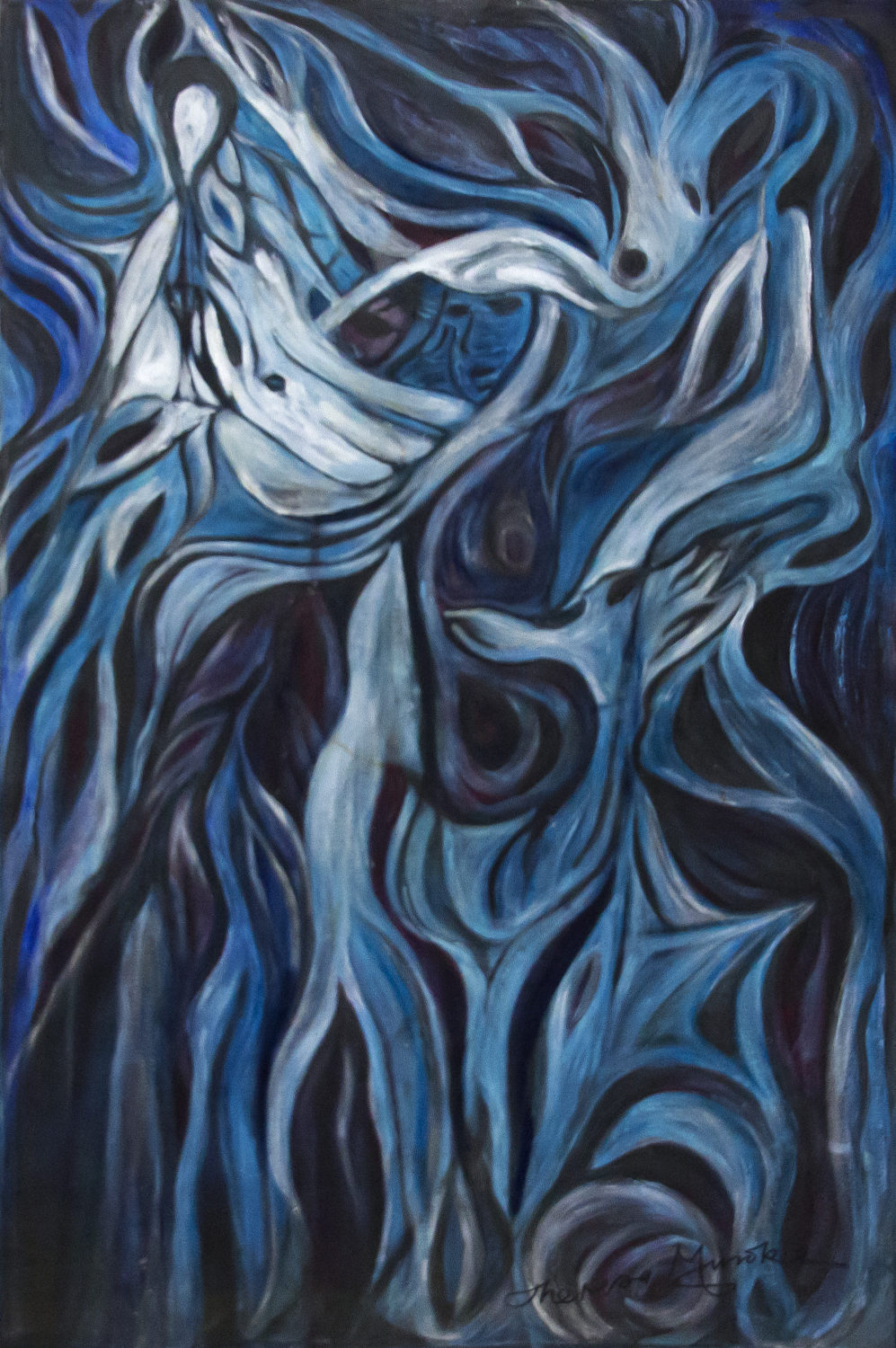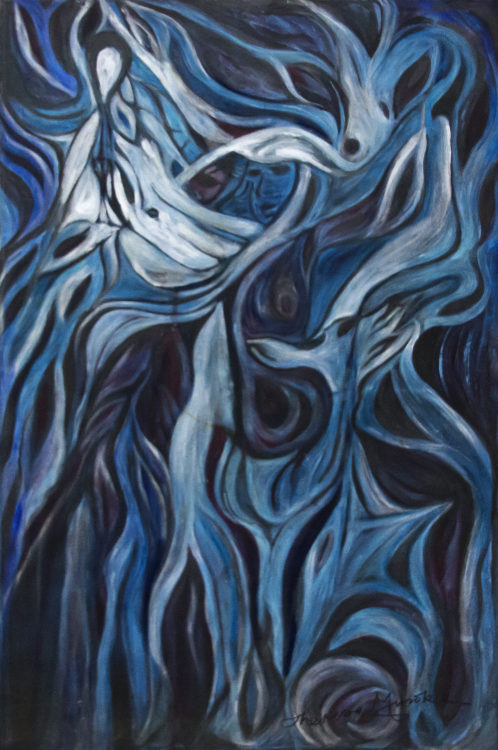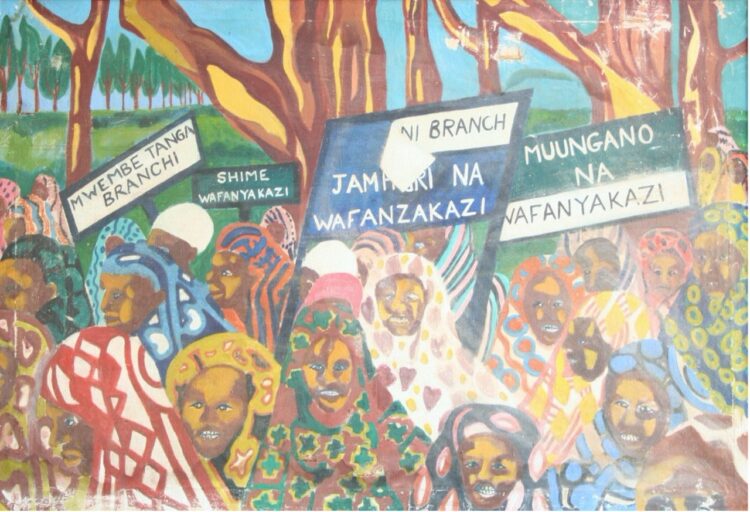Symposium
Theresa Musoke, Untitled, 1996, mixed media on canvas, 147 x 98 cm, Courtesy of the Artist and Circle Art Gallery
Tracing a Decade: Women Artists of the 1960s in Africa focuses on the often-overlooked contributions of women artists during this pivotal decade across the African continent. The symposium illuminates the paths and works of women artists whose practice has been blurred for decades and whose contributions to early postcolonial narratives are yet to be recognized. Guided by a set of key questions, the researchers investigate the identities and stories of women artists from the 1960s, uncover the intricacies of their creative processes, and explore how they navigated the artistic landscape of the changing Africa. Additionally, the symposium examines the thematic concerns and reception of women artists’ work during a time of socio-political transformation.
The 1960s in Africa were a transformational period defined by the triumphs of independence, the complexities of nation-building, and the aspirations for a brighter future. As the continent underwent radical shifts, it laid the groundwork for subsequent decades, shaping the diverse and dynamic Africa we know today. The 1960s served as a crucible for the shaping of postcolonial narratives through the founding and development of several groundbreaking cultural initiatives, including Transition Magazine, founded in Uganda in 1961; the 1962 Conference of African Writers of English Expression, held at Makerere University College in Kampala; the Black Orpheus journal based in Nigeria; and the World Festival of Negro Arts held in Dakar in 1966. Together, these platforms contributed significantly to the intellectual and cultural renaissance of Africa in the 1960s, shaping narratives and fostering a sense of solidarity among black artists and thinkers.
Drawing inspiration from Chika Okeke-Agulu’s insights into the evolution of modern African art history in “The Challenge of the Modern”, the symposium acknowledges the broader context of the 1960s, emphasizing the need to fill a critical gap in the recognition of women artists during this transformative decade. By tracing their paths, understanding their methodologies, and exploring the reception of their work, the symposium aspires to contribute to a more comprehensive and inclusive narrative of African art history. It aligns with Okeke-Agulu’s call for a deeper examination of overlooked precursors, specifically focusing on the women who played integral roles in shaping the artistic landscapes of Africa during the 1960s.
The language of the symposium will be English.
Practical informations
March 8-9, 2024, from 2:00 to 5:00
Makerere University (CTF building)
Kampala, Uganda
Confirmed speakers: Dorothy Akpene Amenuke, N’Goné Fall, Merve Fejzula, Gladys Kalichini, Liz Kobusinge, Nadira Laggoune, Portia Malatjie, Lerato Shadi.
For the full programme, please visit the Njabala Foundation website.
Université Makerere (bâtiment CTF)
2:20 pm | N’Goné Fall, Keynote – Women and Independence
2:50 pm | Nadira Laggoune –Independence and women artists in the construction of a local art in Algeria
3:40 pm | Portia Malatjie – Black Women Artists in Politics: Practicing Inside Subjection
Université Makerere (bâtiment CTF)
2:10 pm | Karen Milbourne, Keynote
2:40 pm | Gladys Kalichini – A Critical Analysis of the Visibility of Women Artist’s Practices in Post-Independence Zambia
3:10 pm | Merve Fejzula – In, But Not of: Younousse Seye’s Art of Ambivalence
4:10 pm | Dorothy Akpene Amenuke – Women, Arise! Building a Compendium of Ghanaian women creative practitioners from the post-independence era onwards.
4:40 pm | Liz Kobusinge – Rebeka Njau
5:10 pm | Lerato Shadi – Erasure of women and their contributions from historical narratives
The Tracing a Decade: Women Artists of the 1960s in Africa symposium is organised by Njabala Foundation and AWARE: Archives of Women Artists, Research and Exhibition as part of a research program of the same name.
The Njabala Foundation is a not-for-profit organisation based in Uganda and founded in 2021 by Ugandan curator Martha Kazungu to facilitate visibility for women artists in Africa and its diaspora through exhibitions, research, mentorship, and community engagement.
This project is an extension of Institut français Africa2020 Season. As such, it benefits from the support of the Patrons Committee. It is also supported by Fondation Gandur pour l’art.








